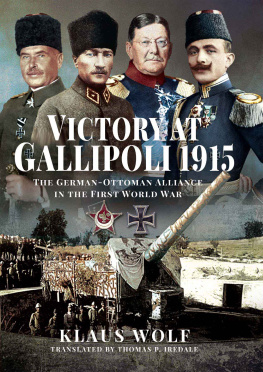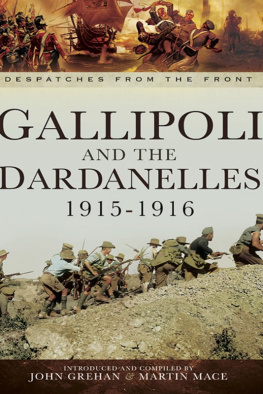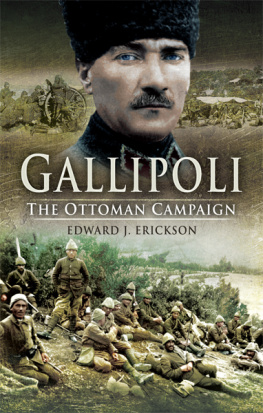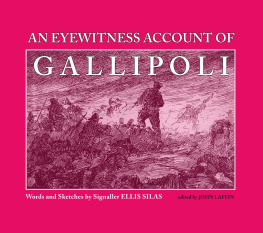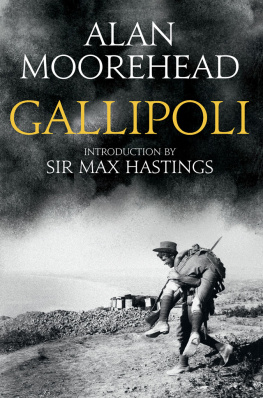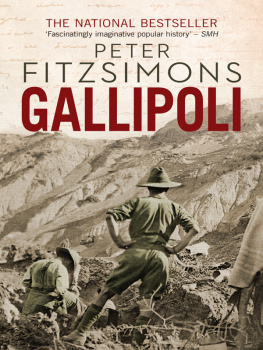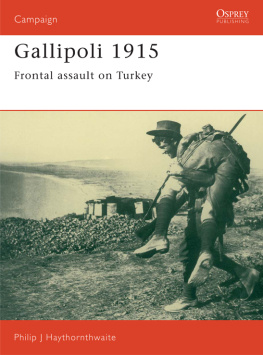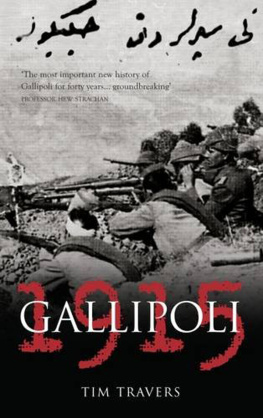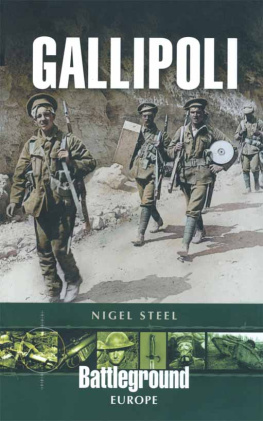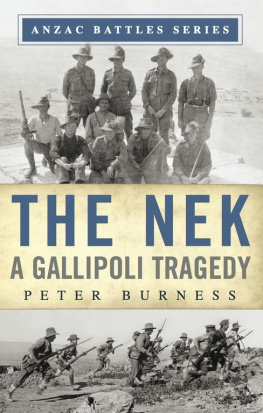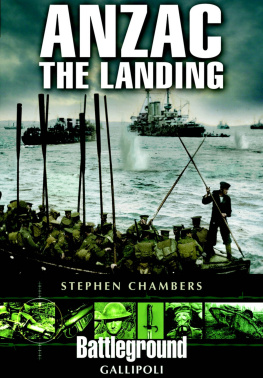Klaus Wolf - Victory at Gallipoli, 1915
Here you can read online Klaus Wolf - Victory at Gallipoli, 1915 full text of the book (entire story) in english for free. Download pdf and epub, get meaning, cover and reviews about this ebook. year: 2020, publisher: Pen and Sword Military, genre: Science. Description of the work, (preface) as well as reviews are available. Best literature library LitArk.com created for fans of good reading and offers a wide selection of genres:
Romance novel
Science fiction
Adventure
Detective
Science
History
Home and family
Prose
Art
Politics
Computer
Non-fiction
Religion
Business
Children
Humor
Choose a favorite category and find really read worthwhile books. Enjoy immersion in the world of imagination, feel the emotions of the characters or learn something new for yourself, make an fascinating discovery.
- Book:Victory at Gallipoli, 1915
- Author:
- Publisher:Pen and Sword Military
- Genre:
- Year:2020
- Rating:4 / 5
- Favourites:Add to favourites
- Your mark:
- 80
- 1
- 2
- 3
- 4
- 5
Victory at Gallipoli, 1915: summary, description and annotation
We offer to read an annotation, description, summary or preface (depends on what the author of the book "Victory at Gallipoli, 1915" wrote himself). If you haven't found the necessary information about the book — write in the comments, we will try to find it.
Victory at Gallipoli, 1915 — read online for free the complete book (whole text) full work
Below is the text of the book, divided by pages. System saving the place of the last page read, allows you to conveniently read the book "Victory at Gallipoli, 1915" online for free, without having to search again every time where you left off. Put a bookmark, and you can go to the page where you finished reading at any time.
Font size:
Interval:
Bookmark:

Victory at Gallipoli, 1915
The German-Ottoman Alliance in the First World War
Klaus Wolf
Translated by Thomas P Iredale

First published in Great Britain in 2020 by
PEN & SWORD MILITARY
An imprint of
Pen & Sword Books Ltd
Yorkshire Philadelphia
Copyright Klaus Wolf and The Gallipoli Association, 2020
Copyright English Translation Thomas P Iredale, 2020
ISBN 978 1 52676 816 2
eISBN 978 1 526 76 817 9
Mobi ISBN 978 1 526 76 818 6
The right of Klaus Wolf to be identified as the Author of this work has been asserted by him in accordance with the Copyright, Designs and Patents Act 1988.
The right Thomas P Iredale to be identified as the Translator of this work has been asserted by him in accordance with the Copyright, Designs and Patents Act 1988.
A CIP catalogue record for this book is available from the British Library.
All rights reserved. No part of this book may be reproduced or transmitted in any form or by any means, electronic or mechanical including photocopying, recording or by any information storage and retrieval system, without permission from the Publisher in writing.

Pen & Sword Books Limited incorporates the imprints of Atlas, Archaeology, Aviation, Discovery, Family History, Fiction, History, Maritime, Military, Military Classics, Politics, Select, Transport, True Crime, Air World, Frontline Publishing, Leo Cooper, Remember When, Seaforth Publishing, The Praetorian Press, Wharncliffe Local History, Wharncliffe Transport, Wharncliffe True Crime and White Owl.
For a complete list of Pen & Sword titles please contact
PEN & SWORD BOOKS LTD
47 Church Street, Barnsley, South Yorkshire, S70 2AS, England
E-mail:
Website: www.pen-and-sword.co.uk
Or
PEN & SWORD BOOKS
1950 Lawrence Rd, Havertown, PA 19083, USA
E-mail:
Website: www.penandswordbooks.com
I would like to extend my heartfelt thanks to all those people without whom this English edition would never have appeared. First and foremost, my thanks goes to Thomas Tom Iredale, who took the initiative for the translation, brought the case forward to the Gallipoli Association and did tremendous work, not only in the translation, but also in reviewing the original book, which has led to this new, revised edition.
My gratitude goes to the following people and organisations:
For the original German edition:
My wife Suzan for her everlasting patience and letting me spend so much time at my desk, in archives and at Gallipoli.
Count Jesko zu Dohna, Colonel (Retd) Klaus Hammel, Colonel Ullrich Kastilan, General (Retd) Klaus Reinhardt and Dr Norbert Schwake for their support and guidance; Lieutenant Colonel Thomas Eckel for the creation of the original cartographic material; Mr Turgay Erol, owner of the Deniz Kitabevi bookshop, for pictures from his collection and Eric Goosens and his wife, zlem for their friendly support and hospitality in The Gallipoli Houses during my trips to the Peninsula; Bernd Langensiepen for permission to quote from his book and to all the German families, who shared with me pictures and documents of their forebears active in Gallipoli; the staffs of the German Defence Attach in Ankara and the German Consulate General in Istanbul, as well as the Orient Institute in Istanbul; the Bundesarchiv/ Militrarchiv in Freiburg and Coblenz, as well as the Political Archive of the German Foreign Office in Berlin for their support in document and picture research; and the Volksbund Deutsche Kriegsgrberfrsorge (The German War Graves Commission).
For the English edition:
The Gallipoli Association, for sponsoring the translation and publication of this edition; Stephen J Chambers for his steady encouragement and factual guidance; Michael D Robson, Tel Aviv, for help in proof reading, fact checking and editing; William Bill Sellars, Eceabat, for his insightful observations and support; Bernard de Broglio, Australia, for help on the formation of the Turkish Air Arm; and Gunter Hartnagel, Germany, for his picture material.
E ver since Klaus Wolf s book Gallipoli, 1915: Das Deutsch-Trkische Militrbndnis im Ersten Weltkrieg was published in German in 2008, I was one amongst many waiting for this book to be translated into English. Later I found out that this was also the authors hope, although that never reached fruition for one reason or the other. During the spring of 2017 the seeds of the idea were re-germinated during a drink with some friends in a bar overlooking the Dardanelles. This in turn led to meeting Klaus in 2018 during the Gallipoli Association conference when he delivered an excellent presentation, entitled Gallipoli Through German Eyes. The conference audience was unaware that we were well underway with the translation, thanks to Thomas Iredale, and, supported by The Gallipoli Association, Pen & Sword Books Ltd were ready to publish this revised edition.
From a German point of view, with the end of the Great War Gallipoli rapidly became both a forgotten campaign and victory. Gallipoli has little national significance for Germany today, and nowhere near the scale that Turkey places on the campaign. This is not purely because the victory brought the Turks military prestige at a time when it was so badly needed, but because of the deeds of Mustafa Kemal Atatrk and the viewpoint that Gallipoli was the birthplace of modern Turkey. Amongst the allies a similar significance is placed on the campaign by Australia and New Zealand, where it has a similar, almost mystical, significance. For Germany there was none.
The integrity of Turkey and the Ottoman Empire was underpinned to a large degree by Germany. Military cooperation strengthened after the Ottoman armys defeat in the Balkan Wars when military assistance was needed to reorganise the Ottoman forces. Building on foundations already in place, thanks to General Colmar von der Goltz, Germany despatched a sizeable Military Mission under General Otto Liman von Sanders in 1913, which helped in the development of military training and the reorganisation of the Turkish armaments industry. At about the same time, the Turkish government invited British and French advisors to modernise the navy and shore-based Dardanelles defences. It is ironic that it would be the very same defences the allies would be pitched against in 1915.
With the outbreak of war and the welcoming of the SMS Goeben and SMS Breslau , any secrecy over the Turkish-German pact was no more. German Admiral Souchon was appointed commander in chief of the Ottoman navy and, with Enver Pashas permission, made an unprovoked attack on the Russian seaports in the Black Sea in 1914. The Turks had been thrown into a powder keg that sparked the war between Russia and Turkey, and then Britain and France. A world war had begun, with Turkey becoming Germanys pawn.
How significant was Germanys help? Without German support I do not believe that Ottoman military forces would have performed as well in battle as they did during the campaign. Germanys contribution in leadership, equipment, munitions, medicine and training is notable and should not be underestimated. I would go so far as to say that without German involvement there would have been no Turkish victory, because there would have been no reason at all for the Allies to mount an offensive against the Dardanelles. By the very act of intervention, Imperial Germany had succeeded in bringing Turkey into the war and the campaign tied down the best part of half a million Allied troops. Indirectly, this aided the German efforts on the Western Front, if only to preserve the stalemate.
Font size:
Interval:
Bookmark:
Similar books «Victory at Gallipoli, 1915»
Look at similar books to Victory at Gallipoli, 1915. We have selected literature similar in name and meaning in the hope of providing readers with more options to find new, interesting, not yet read works.
Discussion, reviews of the book Victory at Gallipoli, 1915 and just readers' own opinions. Leave your comments, write what you think about the work, its meaning or the main characters. Specify what exactly you liked and what you didn't like, and why you think so.

